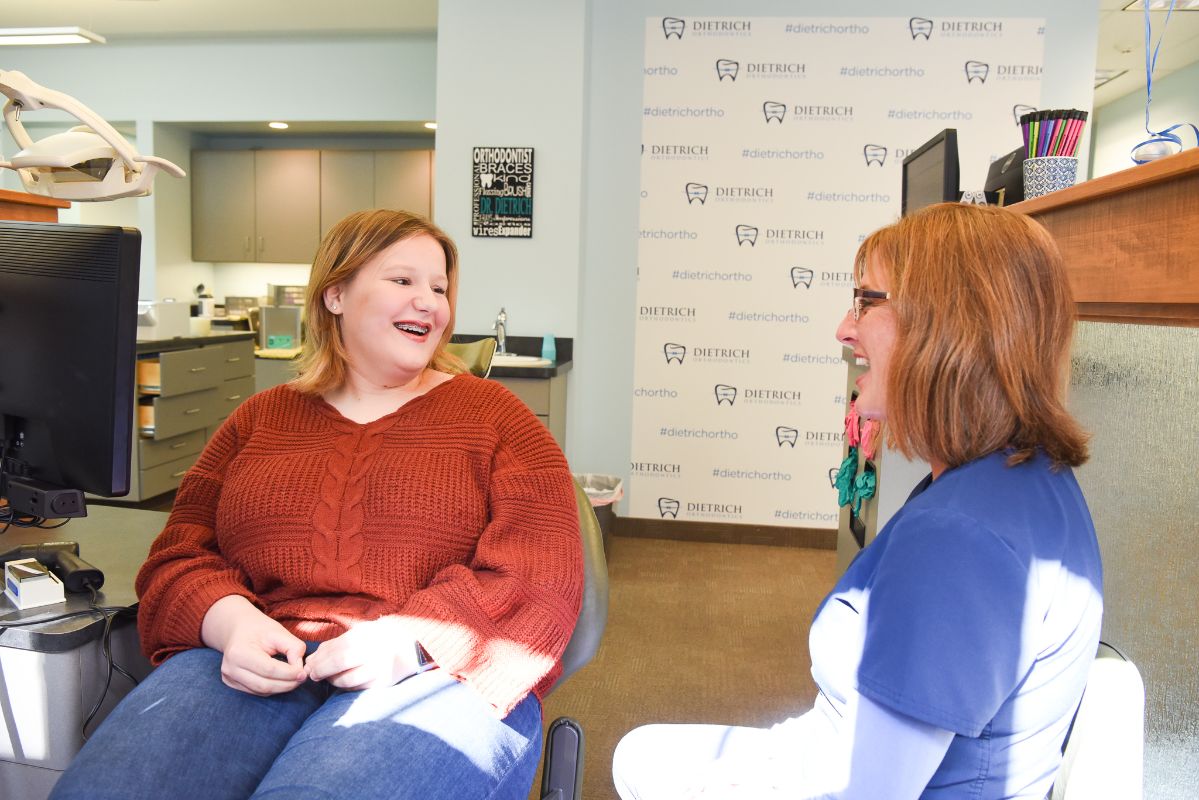Here at Dietrich Orthodontics, one of the most common concerns among patients is that braces will be painful. The good news is that it doesn’t hurt when getting braces, so there’s no reason to worry about your placement appointment. However, you may experience some soreness once the wire and brackets are engaged, even though our cutting-edge technology is designed to reduce discomfort. Mild tenderness is common in the first week after getting braces, but don’t let that scare you! We’ve put together 5 tips for surviving your first week in braces. Keep reading below to learn more!
Minimize discomfort before leaving our office
You should take a few easy steps every time you get ready to leave our Canton and Alliance offices. The first is double-checking that the wire ends of your braces aren’t poking into your cheeks or tongue. This reduces discomfort between visits. You’ll also want to ensure you have an adequate supply of the orthodontic essentials, like dental wax and elastic bands. Finally, carefully note Dr. Dietrich’s guidelines until your next appointment. These may include instructions on how to wear your elastics, adjust an expander, use headgear, or simple guidelines to follow for efficient oral hygiene.
Plan out your meals and snacks
The adhesive we use to attach brackets to the surface of your teeth dries quickly but takes about 24 hours to set fully. You can eat during that time, but it’s important to follow the guidelines for braces-safe foods. Adjusting to eating with your braces may take a few days, so start with softer foods first.
Soups, pasta, yogurt, mashed potatoes, applesauce, and boiled vegetables are excellent options, so stock up before you get your braces! As a bonus, the warmth of soup and mashed potatoes can be soothing, while yogurt’s cool temperature and smooth texture can help relieve soreness.
Prepare for pain relief
Modern orthodontic treatments are more comfortable than ever before, but as we mentioned above, you may occasionally experience some mild discomfort or tenderness. This usually occurs in the first few days after you get your braces and can happen after adjustment appointments.
Any sensitivity should be temporary and will go away on its own, but get a head start by ensuring you have an over-the-counter pain reliever on hand! It’s usually okay to take this right before your bonding appointment and any adjustments but get your orthodontist’s approval first. A warm washcloth or heating pad placed outside your jaw is also an excellent way to relieve the minor aches and pains associated with your braces.
Brush up on at-home remedies
It’s not unusual for the inside of your lips and cheeks to be irritated right after you get braces. As your mouth toughens up, this will disappear, but there’s no need to suffer in the meantime! Saltwater rinses are a tried-and-true home remedy for relieving soreness and something that you can repeat several times a day. Mix one teaspoon of salt in 8 ounces of warm water, then swish it around your mouth for about 30 seconds before spitting it out.
If specific areas of your braces irritate the inside of your mouth, try warming up a small piece of orthodontic wax between your fingers and sticking it to the places that are bothering you. This will provide a barrier between your braces and the sensitive tissues inside your lips and cheeks. You’ll need to remove the wax before brushing your teeth or eating, but you can reapply it as needed.
Be consistent with your oral hygiene
Brushing and flossing are probably second nature by now, but getting braces can shake things up! Getting comfortable with oral hygiene as an orthodontic patient takes time, but it’s an essential part of treatment. While it may feel strange at first, you’ll get the hang of it in no time! We’ll show you how to brush and floss correctly after your braces are on, but here are some additional tips in case you need extra help.
- Aim to brush your teeth in the morning, after meals and snacks, and every night before bed. Use fluoride toothpaste and brush for at least three minutes for the best results. If you’re out, try rinsing your mouth before and after eating, and brush as soon as possible.
- Tilt your soft-bristled toothbrush at a 45-degree angle and use medium pressure to brush along the top and bottom of your brackets. Take care to clean the surface of every tooth and get in behind your molars. Pay close attention to your gum line, too!
- Floss once each day. You may find it time-consuming to use traditional floss with your braces; an orthodontic flosser or floss threader can make the process much easier! Make sure you floss every side of each tooth up to the gums before moving on.
- Nothing should take the place of your regular flossing routine. However, tools like interproximal brushes can be great for getting into all the nooks and crannies your braces create. Waterpiks are also an excellent way to rinse away food particles in hard-to-reach places.
Get your braces journey off to the best start with Dietrich Orthodontics
Like most new things in life, there’s an adjustment period that comes with braces. Your tongue and lips need to get used to sharing space with the brackets and wires, and you’ll probably feel like your braces are very noticeable at first. This won’t last forever! You’ll get used to your braces more quickly than you’d think, and after some time has passed, you’ll hardly notice them anymore.
Remember that we’re always here to answer any questions you have about your orthodontic journey. Working together as a team with Dr. Dietrich will give you the best experience and results!
Are you interested in how braces can transform your smile and want to learn more about our treatment options? Get in touch today to schedule your FREE consultation with Dr. Dietrich in our Canton or Alliance office.


